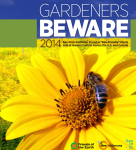from Debra Lynn Dadd
 We’ve all heard that bees are dying off at an alarming rate, and this has been attributed in part to pesticides used in agriculture.
We’ve all heard that bees are dying off at an alarming rate, and this has been attributed in part to pesticides used in agriculture.
But a new study from Friends of the Earth and Pesticide Action Network found that bees are being killed by pesticides on plants in our own backyards…on plants that are being sold as “bee-friendly.”
The study shows that 36 out of 71 (51 percent) of garden plant samples purchased at top garden retailers in 18 cities in the United States and Canada contain neonicotinoid (neonic) pesticides — a key contributor to recent bee declines. Some of the flowers contained neonic levels high enough to kill bees outright assuming comparable concentrations are present in the flowers’ pollen and nectar. Further, 40 percent of the positive samples contained two or more neonics.
These toxic, long-lived insecticides not only harm bees, but can also harm butterflies, earthworms, birds and other beneficial animals in our gardens for months to years.
Of course, you could simply not buy these plants, but they aren’t generally labeled as to the type of pesticide used. And it’s not just bee-friendly plants. All plants in garden centers could have harmful pesticides on them.
You can also shop at an organic nursery if you have one in your area (I have two).
The real solution is to get them off the shelves.
Friends of the Earth: New tests find bee-killing pesticides in 51% of “bee-friendly” plants from garden centers across U.S. and Canada A short summary of the report
Friends of the Earth: Gardener’s Beware The full report
HealthyStuff.org Lend your voice to a campaign asking retailers to remove plants with bee-kiling pesticides from their shelves.




Thanks for spreading the word on this. Monsanto, Bayer, and Syngenta, the big chemical corporations, are fighting back with misinformation campaigns. They fear restrictions on neonics will lead to restrictions on other poisons. We can only hope that happens.
Many nurseries don’t even know about neonics, as the plants come from the suppliers pre-treated. The more people ask about it, the more our nurseries will demand change. Refuse to buy plants unless neonic-free, and tell the nurseries. Our power as consumers is mighty.